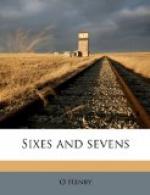And then old man Ellison took another look at Sam’s face and saw that the minstrel had changed to the man of action.
And while Sam is unbuckling from his waist old man Ellison’s six-shooter, that the latter had left behind when he drove to town, we may well pause to remark that anywhere and whenever a troubadour lays down the guitar and takes up the sword trouble is sure to follow. It is not the expert thrust of Athos nor the cold skill of Aramis nor the iron wrist of Porthos that we have to fear—it is the Gascon’s fury—the wild and unacademic attack of the troubadour—the sword of D’Artagnan.
“I done it,” said Sam. “I went over to Frio City to do it. I couldn’t let him put the skibunk on you, Uncle Ben. I met him in Summers’s saloon. I knowed what to do. I said a few things to him that nobody else heard. He reached for his gun first—half a dozen fellows saw him do it—but I got mine unlimbered first. Three doses I gave him—right around the lungs, and a saucer could have covered up all of ’em. He won’t bother you no more.”
“This—is—King—James—you speak—of?” asked old man Ellison, while he sipped his coffee.
“You bet it was. And they took me before the county judge; and the witnesses what saw him draw his gun first was all there. Well, of course, they put me under $300 bond to appear before the court, but there was four or five boys on the spot ready to sign the bail. He won’t bother you no more, Uncle Ben. You ought to have seen how close them bullet holes was together. I reckon playing a guitar as much as I do must kind of limber a fellow’s trigger finger up a little, don’t you think, Uncle Ben?”
Then there was a little silence in the castle except for the spluttering of a venison steak that the Kiowa was cooking.
“Sam,” said old man Ellison, stroking his white whiskers with a tremulous hand, “would you mind getting the guitar and playing that ‘Huile, huile, palomita’ piece once or twice? It always seems to be kind of soothing and comforting when a man’s tired and fagged out.”
There is no more to be said, except that the title of the story is wrong. It should have been called “The Last of the Barons.” There never will be an end to the troubadours; and now and then it does seem that the jingle of their guitars will drown the sound of the muffled blows of the pickaxes and trip hammers of all the Workers in the world.
II
THE SLEUTHS
In The Big City a man will disappear with the suddenness and completeness of the flame of a candle that is blown out. All the agencies of inquisition—the hounds of the trail, the sleuths of the city’s labyrinths, the closet detectives of theory and induction—will be invoked to the search. Most often the man’s face will be seen no more. Sometimes he will reappear in Sheboygan or in the wilds of Terre Haute, calling himself one of the synonyms of “Smith,” and without memory of events up to a certain time, including his grocer’s bill. Sometimes it will be found, after dragging the rivers, and polling the restaurants to see if he may be waiting for a well-done sirloin, that he has moved next door.




